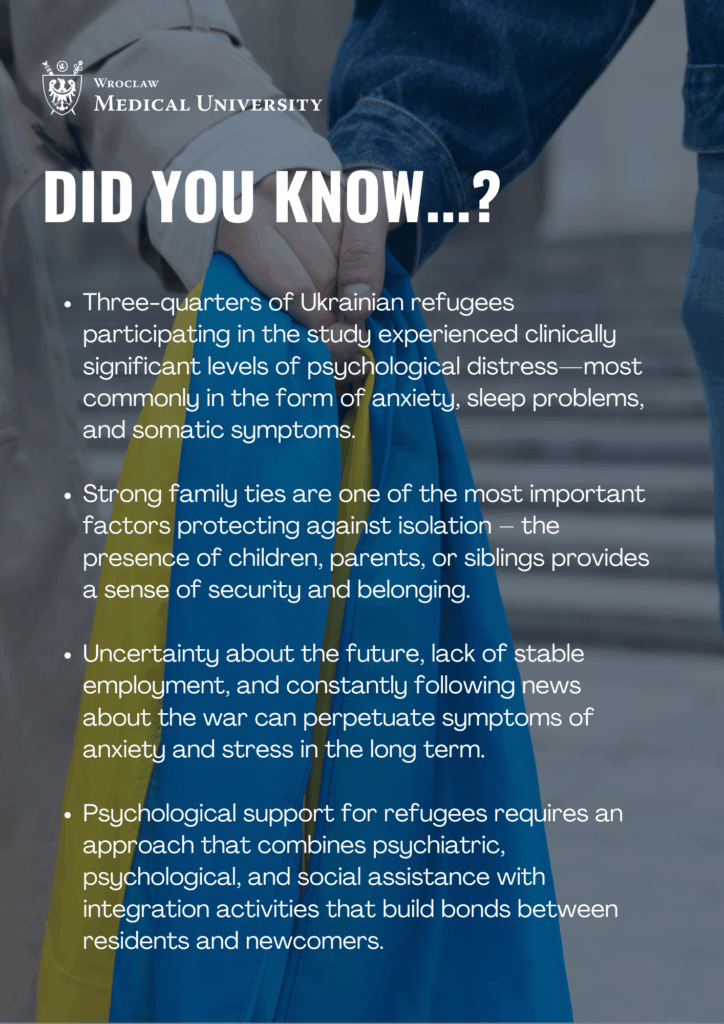The war in Ukraine is not only a tragedy of destroyed cities and lost homes. It is also a silent mental health crisis affecting millions of people forced to flee. A team of researchers from Wroclaw Medical University has studied how war and forced migration affect the mental health of refugees, comparing their experiences with those of the residents of Wroclaw. The results, published in the journal Frontiers in Psychiatry, show that although refugees are more likely to struggle with anxiety and insomnia, they do not feel lonelier than Poles.
Greater psychological burden
The study involved 209 people: 68 war refugees from Ukraine and 141 Polish citizens living in Wrocław. Participants completed standardized questionnaires assessing psychological stress, loneliness, and social network strength.
The results showed that three-quarters of refugees experienced clinically significant levels of psychological distress. They most often reported somatic symptoms, anxiety, and sleep problems. High levels of stress were associated with, among other things, younger age, previous psychiatric problems, and feelings of loneliness.
“In the long term, symptoms of stress and anxiety may intensify if factors such as prolonged uncertainty about the future, limited access to support, or the perpetuation of traumatic experiences are not addressed,” emphasizes Dr. Patryk Piotrowski, MD, PhD, professor.
Loneliness has many faces
Although one might expect refugees to be lonelier, the study did not confirm this. The level of loneliness was similar in both groups – among Ukrainians and Poles alike. This is a surprising result that may reflect the warm reception of refugees in Poland and the cultural and linguistic proximity of the two nations.
“Many refugees, especially women, did not come to Poland in complete isolation,” notes Arkadiusz Jaworski, M.D. “The presence of children, siblings, or parents, as well as the ability to maintain contact with loved ones in Ukraine, helped them maintain emotional balance.”
At the same time, the researchers noted that loneliness and psychological stress are strongly related – the higher the sense of loneliness, the more frequent the symptoms of depression and anxiety.
The strength of family ties
The study also revealed the critical role of social ties. Refugees had more extensive support networks, especially family networks, than Polish participants. Ties with parents, children, or siblings were often a source of security and psychological resilience for them.
“Emotional support and family relationships are critical, but they are not always sufficient,” notes Prof. Piotrowski. “Even strong bonds do not fully protect against symptoms of post-traumatic stress or depression if a refugee’s daily life is marked by uncertainty and instability.”
Implications for mental health policy
The authors emphasize that mental health support for refugees requires an integrated approach combining psychiatric, psychological, and social care. They point to the need to:
- developing local support centers,
- creating integration programs that build social bonds,
- training institutional staff in basic “mental first aid.”
“The most effective forms of support are those that combine emotional, social, and practical assistance,” says Arkadiusz Jaworski, M.D. “It is crucial that refugees have access to psychological support in a language they understand, while at the same time being able to build relationships with the host community.”
Wrocław – a laboratory of solidarity
The project “Not Alone in the Crowd” was carried out as part of the Wrocław Student Activity Fund. The research was conducted in public spaces, aid centers, and universities – in direct contact with participants. The aim was not only to collect data, but also to promote empathy and dialogue between residents and refugees.
“Wrocław was a natural place for such a project,” sums up Dr. Patryk Piotrowski. “It is a city that, since the beginning of the war, has become a space of solidarity and cooperation, and at the same time a laboratory showing how a community can heal the effects of trauma.”

This material is based on the publication:
Comparison of psychological distress, loneliness, and social network structure between Ukrainian war refugees and Polish citizens: a cross-sectional study in Wroclaw
Frontiers in Psychiatry, 2025
Authors: Arkadiusz Jaworski, Michał Szyszka, Daria Sosińska, Nela Tomaszewicz, Romana Bednarchuk, Kinga Kulawik, Patryk Piotrowski